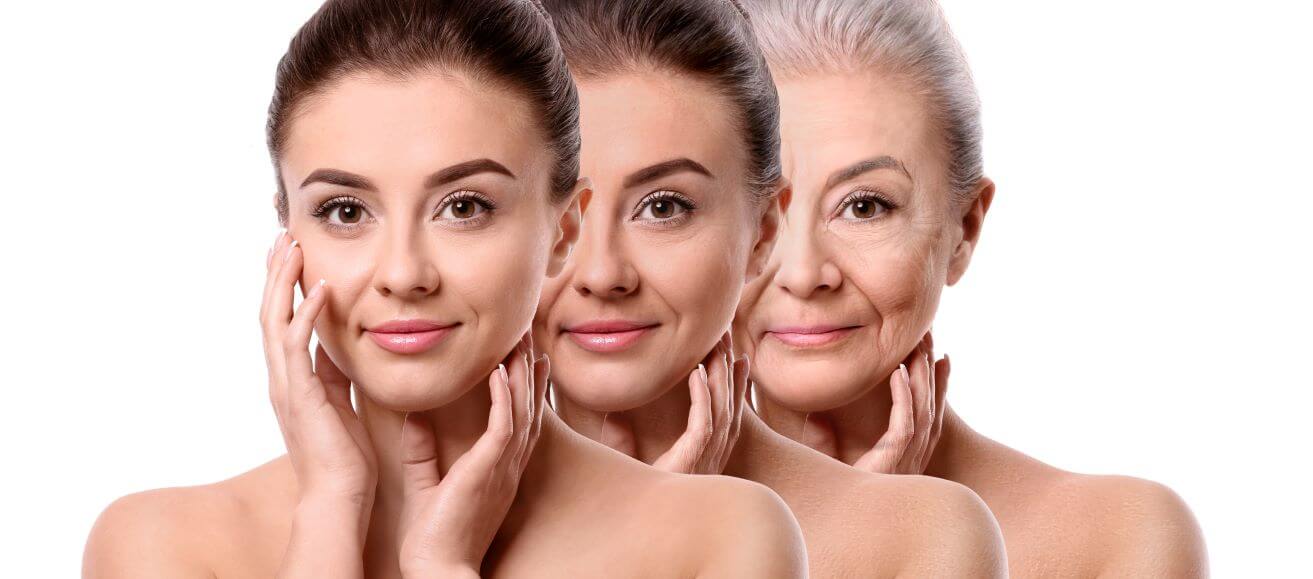We are all aging, but that doesn’t mean we can’t look and feel our best and age more gracefully. According to Dr. Jean Charles of U.S. Dermatology Partners in Cedar Park, Texas, “Maybe you don’t want a science lesson, but having a basic understanding of the science behind skin aging can help you find the best products and take the right steps to prevent skin damage.” In this blog, Dr. Charles discusses the science of how and why skin aging occurs as well as offering tips for preventing skin aging.
Unraveling the Mystery of Aging Skin
After decades of studying skin, scientists and dermatologic researchers have a pretty good understanding of how and why the aging process changes skin. While there are many ways that aging impacts skin, Dr. Charles says, “Gravity is a huge cause of skin aging. Youthful skin is smooth, tight, and lifted. As we age, gravity takes effect and volume shifts toward the bottom of the face. Gravity also contributes to the formation of fine lines and wrinkles. Sun damage, pollutants, and other environmental factors can lead to or accelerate skin aging. Sun and pollutants cause free radical damage that breaks down collagen. Weather and altitude increase stress on the body and skin which accelerates age-related skin changes. The more you understand the science behind skin aging, the more informed you will be when taking steps to prevent and reverse skin damage as you age.”
The Science Behind Skin Aging
All the contributors to skin aging discussed above take decades to change skin. Youthful, healthy skin has a few characteristics that keep it looking smooth and beautiful. Skin cells shed quickly, and healthy cells are revealed. Additionally, collagen and elastin are produced in abundance. This means skin looks and feels smooth, even in skin tone and texture, bright, and firm. When damage occurs, it heals fully. As we age, skin cell turnover slows down along with a decrease in the production of collagen and elastin. This means that skin doesn’t bounce back as quickly, and over time, skin damage accumulates.
External Factors that Accelerate Skin Aging
When it comes to skin aging causes, Dr. Charles says, “The causes of skin aging are either external or internal. The external causes of skin aging are typically things we have more control over, like protecting our skin from external causes of damage.” External causes of skin damage include:
- UV damage from sunlight, tanning beds, and other sources of ultraviolet radiation.
- Pollutant and free radical damage that breaks down cellular DNA.
- Stress which leads to an increase in cortisol causing inflammation.
- Lifestyle factors like smoking, vaping, and drinking alcohol in excess.
How the Body’s Natural Aging Process Affects Skin
The body’s natural aging process is a little more difficult to fight. The slowing down of cell turnover and decreased production of collagen and elastin will happen to everyone. Understanding these changes and working to prevent them can lead to healthier skin at every age and stage of development. That means working with a dermatologist to choose skincare products and dermatologic treatments to keep skin healthy.
Identifying the Signs of Aging Skin
Skin aging is a relatively slow process. Most people see a wrinkle or two pop up in their late twenties or earlier thirties, but they can accumulate and deepen over time. While wrinkles and fine lines are commonly associated with skin aging, they are certainly not the only warning signs. Other common signs of aging skin include:
- Uneven skin texture – dry spots or a buildup of dead skin cells is common as cell turnover decreases with age. If you notice uneven skin texture, you may need to introduce chemical exfoliants or use a stronger retinol at night.
- Thinness – the outer layers of skin atrophies with age, leaving skin more sensitive and easier to damage.
- Paleness – the number of melanocytes (pigment-producing cells) diminishes, giving skin a paler appearance.
- Lentigos – while the number of melanocyte cells decreases with age, the size of the remaining cells increases. It may lead to areas of hyperpigmentation (age spots, liver spots, sunspots) that occur with age due to the accumulation of UV damage.
- Laxity – in addition to fine lines and wrinkles, the skin may begin to look loose or saggy. This also happens as collagen and elastin production slows.
Proactive Steps to Slow Down Skin Aging
The right anti-aging skincare routine has as much to do with your skin type and skin health needs as it does with anti-aging products. Dr. Charles recommends, “It probably sounds self-serving, but working with a dermatologist is the best way to ensure you create a skincare routine that will keep your skin looking great as you age. They can take into consideration your skin type, unique skin health concerns, environment, health history, lifestyle, and the complex range of other factors that impact how skin ages. With this knowledge, they develop a personalized anti-aging skincare routine. They can also recommend dermatologic treatments to reverse or prevent signs of skin aging.”
A basic anti-aging skincare routine should include the following:
- Cleanser –use a gentle cleanser morning and evening to remove the impurities, oils, and grime from the day.
- Toner – used in the morning and at night to balance pH and clarify skin. Some toners can be drying, which isn’t necessarily great for aging skin. The Revision Soothing Facial Rinse is a calming, alcohol-free toner that’s effective for all skin types, including aging skin.
- Serums – morning serum options should include antioxidants like vitamins C and E that reduce the risk of damage from the sun and other environmental aggressors. Evening serums should be soothing, healing, and moisturizing to repair the day’s damage.
- Retinols – to increase skin cell turnover, retinols dissolve dead skin cells and reveal healthy skin below. Retinols can cause sun sensitivity, so it’s recommended to use sunscreen daily in the morning.
- Moisturizers – used in the morning, moisturizers may be light and easily absorbed, especially when it’s warm outside. In the evening, use a richer, cream-based moisturizer to soothe and hydrate skin.
- Sunscreen – sun damage causes numerous symptoms of skin aging, so it’s important to protect the skin from UV rays every day. MD Skin Essentials Tone Shield Matte is an excellent option that is free from dyes, fragrances, parabens, and other potentially damaging ingredients. It also contains an antioxidant complex to boost protection and prevent more types of skin damage.
Aging Gracefully: A Lifelong Commitment
When it comes to anti-aging skincare, Dr. Charles says, “Start your anti-aging skincare routine before you think it’s necessary. The more damage that can be prevented the better. I always recommend partnering with a dermatologist at a young age to ensure you are using the best anti-aging products for your skin type, keeping skin safe from environmental aggressors, and generally doing everything you can to keep skin healthy rather than fighting to turn back the clock once skin aging has occurred. Even if your skin is already showing the signs of your age, there are many dermatologic treatment options we can recommend that allow you to age with a greater sense of confidence and grace. Don’t put off your anti-aging skincare routine even one day longer. If you’re thinking about it now, it’s time to get started.”
Talk to a Trusted Professional About Anti-Aging Skincare
Each person ages differently. A lifetime of exposure to the sun, weather, and other environmental factors will impact the skin in a variety of ways. Practicing good skincare habits at every stage of life is essential to keep skin looking and feeling great at any age. Whether you want to partner with a dermatologist to create a preventive anti-aging skincare routine or you’re ready to discuss more advanced anti-aging skincare options, don’t hesitate to schedule a consultation with the knowledgeable team of professionals at U.S. Dermatology Partners. We make it easy to get started working with our dermatologists. Simply take a few moments to complete our scheduling request form. Once we hear from you, a team member will reach out to answer your questions and schedule an appointment.
Find a location near me
or


